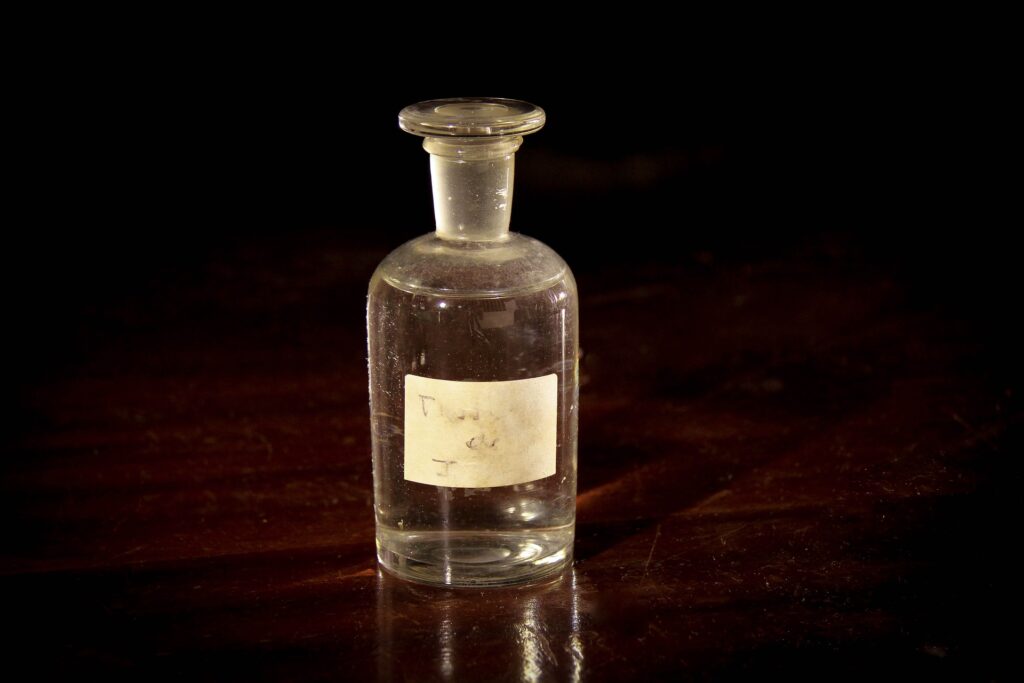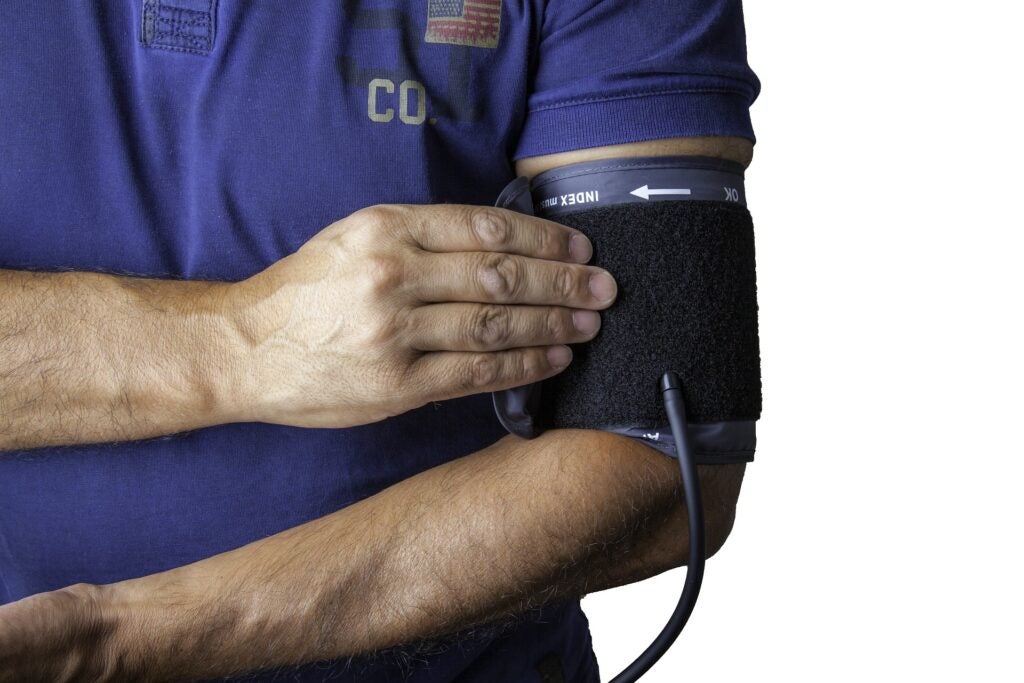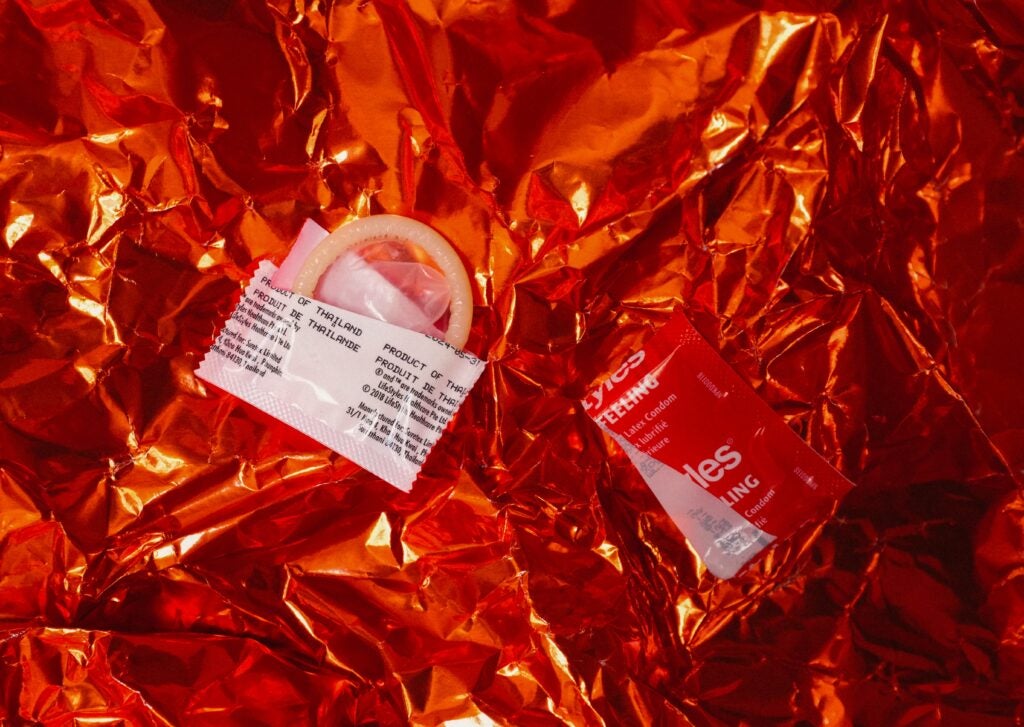
“Poppers” is an informal term used to describe small vials or bottles containing a class of chemicals called alkyl nitrite, usually amyl nitrite, in liquid form. Originally, these bottles were given the name “poppers” from the sound the bottles made when opened or crushed. Each bottle contains a small amount of a highly volatile, clear or yellow liquid that can be inhaled before or during sex. These inhalants can be dangerous and should not be used around an open fire, allowed to touch the skin, or ingested in any way. Poppers are said to enhance sexual activity by giving the user a sense of euphoria for a short period of time along with several physiological responses.
Originating in the 1960s, poppers gained popularity on the dance floors of discos and raves, particularly amongst gay and bisexual men.1 Today, poppers are often commercially sold in adult book or film stores or even in smoke shops as “room odorizers.” The brightly colored, tiny bottles are usually labeled as RUSH, STUD, RAM, or even “Liquid Gold” to name a few.2 The prevalent usage of inhalants to facilitate sexual intercourse has led to significant research on the body’s response to inhaling these chemicals as well as some of the risks associated with inhalants. In this article, we will outline these bodily responses to such inhalants and provide information about the risks associated with using poppers.
Table of Contents
Bodily Response

In the human body, nitrite inhalants are rapidly metabolized. The effect is almost immediate but does not last very long, usually around two to five minutes. The chemical, amyl nitrite, acts as a vasodilator; thus, it increases the user’s heart rate and widens the veins and arteries in the body, allowing for increased blood flow, especially to the face and head.3 The effect is a “head rush” or “high” which can be characterized by warm sensations, facial flushing, and feelings of throbbing or pulsing; more severe side effects include headaches, vomiting, or even fainting.3 Because of their primary effect as a vasodilator, individuals who are concerned or have trouble with low blood pressure should not use poppers.
Inhalants facilitate sexual interactions by increasing blood flow and relaxing muscles, including the sphincter in the anus, allowing for easier anal penetration. Their popularity amongst men who have sex with men could be attributed to this. Individuals who use poppers report experiencing more intense or longer orgasms. Nitrites are also reported to increase one’s sexual desire or libido. This can often be to the detriment of safe sex practices.4 Other results vary as some report a reduction in premature ejaculation, while others report greater difficulty achieving an erection.2 Should one decide to use poppers during intercourse, it is still incredibly important to use a condom and sufficient lubrication, particularly during anal sex. While poppers have their appeal, we do not condone their usage as they can lead to riskier sexual behavior and have other harmful effects on the user.
Risks
Excessive use of poppers can be harmful to those abusing them. The high toxicity of nitrite inhalants can lead to yellow, crusty, skin irritations around the nose, lips, or genitals. Some users report experiencing headaches, dizziness, nausea, vomiting, or even fainting after inhaling poppers.4 In a study done using nitrite chemicals on mice, researchers found that the nitrites reacted with chemicals in the bodies of the mice to produce new compounds which could be carcinogenic or tumor promoting.4 This is not to say that nitrite use causes cancer; however, overexposure might have more severe, detrimental effects on the body.

Since the 1980s, the AIDS epidemic has prompted research about whether nitrite inhalants, common amongst gay and bisexual men, facilitate the spread of HIV. Research has shown that while these inhalants are not causing transmission of the virus, they could lead to riskier sexual behaviors that potentially contribute to the spread of the disease. One study from 2007 found that men who used poppers in their sample were 17 times more likely to have more casual partners and 7 times more likely to engage in unprotected anal sex than individuals who did not use poppers.5 A different 2005 study, conducted of over 3,200 men who have sex with men in six different cities in the United States, found a strong association between nitrite use and prospective HIV infection.6 Because poppers relax the anal muscles, this makes the receptive partner less sensitive to minor tears in the anus that could more easily spread sexually transmitted infections (STIs). If one abuses nitrite inhalants, practices unprotected sex, and has multiple partners, they are at high risk for STIs. We highly recommend enacting a positive lifestyle change to reduce your consumption of poppers, use a condom, and limit your number of partners. In addition, one might consider talking to their doctor about PrEP, a daily pill that people can take to preemptively protect themselves from HIV infection. We cannot condone using poppers as they are often conducive to unsafe sex practices, such as unprotected anal sex with multiple partners. If one chooses to use poppers during sex, they should do so carefully, with protection, and with a trusted, intimate partner.
Concluding Remarks
Since their creation in the 1960s, poppers have gained popularity, especially amongst communities of gay and bisexual men. Using poppers can certainly complicate sex if one is unaware or unprepared for their effects. We hope this article helped you to better understand what nitrates are and their effect on the body so that if you do encounter them you can make an informed decision about their usage in your life. If you have further questions about poppers or sex in general, please remember to use our Ask the Sexperts feature.
References
- Stefanidou, Lefkidou, Lefkidis, Spiliopoulou, & Maravelias. (2010). Death of an HIV-infected homosexual from nitrite inhalants (poppers). The West Indian Medical Journal, 59(4), 450-2.
- “Nitrites.” DrugWise, 22 Dec. 2016.
- Romanelli, F., Smith, K. M., Thornton, A. C. and Pomeroy, C. (2004), Poppers: Epidemiology and Clinical Management of Inhaled Nitrite Abuse. Pharmacotherapy: The Journal of Human Pharmacology and Drug Therapy, 24: 69–78 doi:10.1592/phco.24.1.69.34801
- Haverkos, & Dougherty. (1988). Health hazards of nitrite inhalants. The American Journal of Medicine,84(3), 479-482.
- Mattheis Kelly, Lampinen Thomas M, Chan Keith, & Hogg Robert S. (2007). Nitrite inhalant use among young gay and bisexual men in Vancouver during a period of increasing HIV incidence. BMC Public Health, 7(1), 35.
- Buchbinder, S P, et al. “Sexual risk, nitrite inhalant use, and lack of circumcision associated with HIV seroconversion in men who have sex with men in the United States.” Journal of acquired immune deficiency syndromes (1999)., U.S. National Library of Medicine, 1 May 2005.
Last Updated: 28 November 2017.
